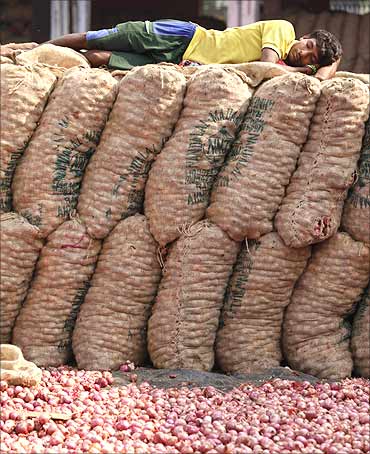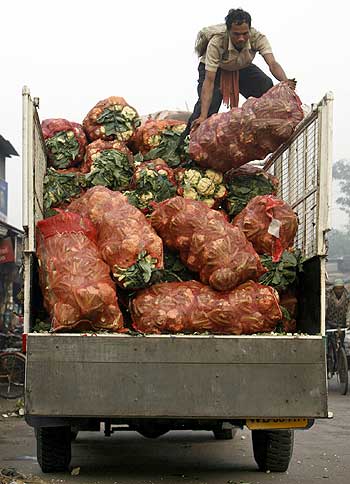Photographs: Amit Dave/Reuters BS Reporter in New Delhi
After two days of discussions on price-control measures at the highest level, the government on Thursday announced the setting up of an inter-ministerial group to streamline and monitor food prices.
It also pressed for stringent action against hoarders, vowed to strengthen the public distribution system and sought to intensify commodity purchases by public sector units for distribution.
Measures announced in the past such as an export ban on onions, pulses, edible oil and non-basmati rice will continue.
Restriction on the export of more commodities would be imposed, if required.
. . .
Govt plan to curb prices? Set up another committee!
Image: Onion prices on the rise.Photographs: Reuters
The government, which was expected to announce more immediate steps to rein in commodity prices, particularly impacting futures trading, failed to do so and opted for a wait-and-watch strategy.
In a statement issued on Thursday, it acknowledged what experts have been saying all along -- that the only lasting solution to food price inflation was increasing agriculture productivity.
| SHOPPING LIST |
| * Ministerial group to be set up |
| * Sale of onions by Nafed, NCCF |
| * Action vowed against hoarders |
| * States to break trader cartels |
| * CoS to review price situation |
. . .
Govt plan to curb prices? Set up another committee!
Image: Cereals and pulses on sale.Photographs: Reuters
The government also said that the recent spike in the price of perishables like fruits & vegetables and milk is the result of rising incomes, which have affected the demand pattern.
"The inter-ministerial group, to be headed by Chief Economic Adviser Kausik Basu, will review the overall inflation situation, with particular reference to primary food articles," said a release from the Prime Minister's Office.
The group will review production and rainfall trends, as well as build institutional machinery to read warning signals, assess international trends, recommend action on fiscal, monetary, production, marketing, distribution and infrastructure fronts to prevent price spikes, and suggest measures to strengthen collection and analysis of data and forecasting.
. . .
Govt plan to curb prices? Set up another committee!
Image: An activist from India's main opposition Bharatiya Janata Party, wearing a garland of vegetables.Photographs: Reuters
The committee of secretaries, under the Cabinet secretary, will review the price situation with individual states and involve central departments with state agencies to arrive at suitable measures on a fast-track.
Cartelisation by large traders will be dealt with strictly.
The states will be requested to ensure that such action is effectively taken under the Essential Commodities Act, 1955, and the Competition Act, 2002.
According to officials, Planning Commission Deputy Chairman Montek Singh Ahluwalia and Basu were against immediate steps that would impact commodities imports or exports or futures trading, as the recent rise in prices is primarily due to horticulture produce and not essential foodgrain.
The government also stated that import restrictions and tariffs would be eased wherever necessary.
Existing schemes for subsidised distribution of onions, edible oils and pulses would be continued.
Government agencies like Nafed and NCCF will receive budgetary support to continue selling onions at Rs 35 a kg.
. . .
Govt plan to curb prices? Set up another committee!
Image: Cauliflowers being loaded on to a truck.Photographs: Reuters
The Centre also placed the onus on states to fight inflation.
State governments will be urged to review the Agricultural Produce Market Committee Act and, in particular, consider exempting horticultural products from its purview to mitigate marketing and distribution bottlenecks.
State governments will also be urged to consider waiving mandi (market) tax, octroi and other local levies that impede smooth movement of essential commodities, as well as to reduce commission agent charges.
A scheme to support state governments in setting up farmers' markets and strengthen the civil supplies corporations will be finalised urgently.







article